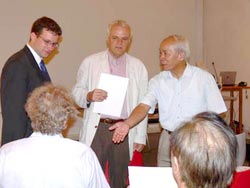The lack of policies to promote the effective exploitation of renewable energy sources, while energy consumption remains wasteful and inefficient… This was the issue raised at the seminar “Sustainable Energy Development in Vietnam” held on June 14 at the Goethe Institute in Hanoi.
About 80 domestic scientists and several foreign energy experts participated in the seminar.
Speaking at the seminar, Professor Pham Duy Hien stated that the electricity supply in Vietnam is currently not being utilized efficiently, with significant losses and wastage. Loss levels can reach up to 15.8%, while in many countries around the world, losses are only about 7-9%.
 |
|
Professor Pham Duy Hien (standing, far right) discussing renewable energy usage in Vietnam with German experts. (Photo: Ngoc Huyen) |
The level of electricity loss is so significant that in the next five years, reducing losses by just 1% could yield an additional 3.4 GWh (Gigawatt-hours) for Vietnam, equivalent to the output of a power plant with a capacity of 500-600 MW.
Meanwhile, other fossil energy sources, such as coal, crude oil, and natural gas, are insufficient to meet the electricity development needs after 2020…
Another scientist, Mr. Nguyen Thuong, also noted that electricity losses during transmission and distribution in Vietnam are currently about 12%, compared to around 7% in some neighboring countries.
To generate 1 USD of added value, Vietnam consumes 30-40% more energy than other countries in the region. Vietnam cannot maintain high GDP growth with the current high energy intensity.
Surprisingly, many renewable energy sources, such as wind, solar, and biomass (from plant and animal sources), are abundant but have yet to be promoted for use to supplement dwindling fossil fuel resources or to keep pace with demand.
| Renewable Energy: Fast, Abundant, Good, and Cheap! |
| Attending the seminar “Sustainable Energy Development in Vietnam,” the German delegation included Dr. Herrmann Scheer (Member of the German Bundestag, Chairman of EUROSOLAR, and Chairman of the International Renewable Energy Committee), Mr. Roman Ritter from the German Technical Cooperation Organization, along with representatives from the Ministry of Industry, Ministry of Science and Technology, Ministry of Planning and Investment, and various scientific associations in Vietnam.
According to Dr. Herrmann Scheer, renewable energy has great potential and can be implemented more quickly than other energy sources. Furthermore, developing renewable energy is simpler, reduces the cost of building power plants, does not destroy the environment, and minimizes the risks associated with fuel imports. The cost of renewable energy continues to decrease after depreciation, is less complex, and is easy to operate, with quick construction times; for instance, a wind power plant can be operational within a week. |
According to Mr. Nguyen Quang Khai, Director of the Center for Energy and Environment, Vietnam currently has over 25 million tons of wood biomass and more than 53 million tons of agricultural by-product biomass… which can generate tens of millions of tons of energy.
Regarding vegetable oil, while some countries have researched using vegetable oil to produce biodiesel blended with gasoline to reduce dependence on oil, there has been no comprehensive research or assessment of this energy source in Vietnam.
As for solar energy, Vietnam has an average of about 2000-2500 sunlight hours per year, with an average total solar radiation energy of approximately 150 kCal/cm2/year. The potential from solar energy could reach about 43.9 billion tons of energy per year.
In terms of wind energy, although Vietnam has many windy locations, there are currently only a few wind power plants with insignificant capacity… According to a report at the seminar, a domestic investor has invested in a wind power plant but has faced policy obstacles, and after 5-6 years, the plant is still not completed.
Many scientists expressed frustration, asserting that Vietnam has yet to announce an official national energy policy. Currently, the Ministry of Industry is still presenting the national energy policy (NLQG) to the government for approval.
To date, Vietnam still lacks a national energy management and regulatory agency. As a result, energy development has been inconsistent across sectors and among major corporations (oil and gas, electricity, coal).
Scientists recommend that the government establish a National Energy Policy Committee to manage and regulate activities in the energy sector, chaired by the Prime Minister, with a national energy policy office to assist in the work.
Ngoc Huyen-Nong Khac Yi















































